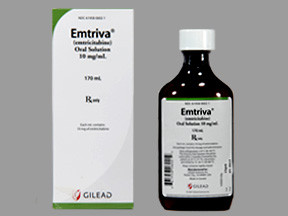EMTRICITABINE - ORAL
PHONETIC PRONUNCIATION: (em-tri-SITE-ah-bean)
COMMON BRAND NAME(S): Emtriva
GENERIC NAME(S): emtricitabine
Uses
USES: Emtricitabine is used with other HIV medications to help control HIV infection. It helps to decrease the amount of HIV in your body so your immune system can work better. This lowers your chance of getting HIV complications (such as new infections, cancer) and improves your quality of life. Emtricitabine belongs to a class of drugs known as nucleoside reverse transcriptase inhibitors-NRTI. Emtricitabine is not a cure for HIV infection. To decrease your risk of spreading HIV disease to others, do all of the following: (1) continue to take all HIV medications exactly as prescribed by your doctor, (2) always use an effective barrier method (latex or polyurethane condoms/dental dams) during all sexual activity, and (3) do not share personal items (such as needles/syringes, toothbrushes, and razors) that may have contacted blood or other body fluids. Consult your doctor or pharmacist for more details.
How to use EMTRICITABINE - ORAL
HOW TO USE: Read the Patient Information Leaflet provided by your pharmacist before you start taking emtricitabine and each time you get a refill. If you have any questions, consult your doctor or pharmacist. Take this medication by mouth, usually once daily with or without food or as directed by your doctor. If you are using the liquid form of this medication, carefully measure the dose using a special measuring device/spoon. Do not use a household spoon because you may not get the correct dose. Dosage is based on your medical condition, dosage form (capsule or liquid), and response to treatment. In children, the dosage may also be based on weight. Do not switch between the capsule and liquid forms. For the best effect, take this medication at evenly spaced times. To help you remember, take this medication at the same time every day. It is very important to continue taking this medication (and other HIV medications) exactly as prescribed by your doctor. Do not skip any doses. Refill your medication before you run out. Do not take more or less of this drug than prescribed or stop taking it (or other HIV medicines) even for a short time unless directed to do so by your doctor. Skipping or changing your dose without approval from your doctor may cause the amount of virus to increase, make the infection more difficult to treat (resistant), or worsen side effects.
Side Effects
Precautions
Interactions
Overdose
Images
Reviews
Faq for EMTRICITABINE - ORAL
Emtricitabine is an oral medication used in combination with other antiviral drugs to treat HIV infection. It helps to decrease the amount of HIV in the blood and improves the immune system.
Emtricitabine is usually taken once a day, with or without food. It is important to take it regularly at the same time each day to maintain a constant level of the drug in your body.
Common side effects of Emtricitabine may include headache, diarrhea, nausea, and rash. Inform your doctor if these side effects become persistent or bothersome.
No, it is essential to continue taking Emtricitabine as prescribed by your doctor, even if you start feeling better. Stopping the medication can lead to the re-emergence of HIV infection and the development of drug resistance.
No, Emtricitabine is not a cure for HIV. It is a part of antiretroviral therapy that helps manage the infection and slows down the progression of HIV to AIDS.
Moderate alcohol consumption is generally acceptable while taking Emtricitabine. However, excessive alcohol intake can potentially increase the risk of side effects, such as liver problems. It is best to consult your doctor regarding alcohol use.
Emtricitabine is generally considered safe to use during pregnancy. It is commonly prescribed in pregnant women living with HIV to prevent transmission of the virus to the baby. However, it is crucial to discuss with your healthcare provider before initiating any medication during pregnancy.
Emtricitabine - Oral is used in combination with other medications to treat HIV infection. It helps to control the virus and improve the immune system.
You should take Emtricitabine - Oral as prescribed by your doctor. Generally, it is taken once daily with or without food.
Common side effects may include nausea, diarrhea, headache, dizziness, and trouble sleeping. It is important to notify your doctor if these side effects persist or worsen.
Emtricitabine - Oral is not a cure for HIV but rather helps to control the virus and improve the immune system. It should be used in combination with other medications as prescribed by your doctor.
There are some medications that may interact with Emtricitabine - Oral, including other antiviral drugs, certain antibiotics, and certain antifungal medications. It is important to inform your doctor about all the medications you are taking to avoid potential interactions.
Moderate alcohol consumption is generally considered acceptable while taking Emtricitabine - Oral. However, it is advisable to consult with your doctor as excessive alcohol use can have negative effects on liver function.
If you miss a dose, take it as soon as you remember. However, if it is close to the time for your next dose, skip the missed dose and resume your regular dosing schedule. Do not double the dose to make up for a missed one.
Emtricitabine - Oral should be used during pregnancy only if clearly needed as determined by your doctor. It is important to discuss the potential risks and benefits with your healthcare provider.
Emtricitabine - Oral can be used in children under the guidance of a healthcare provider. The dosage and duration of treatment will be determined by the child's age, weight, and overall health.
Warning
WARNING: This medication is not approved for the treatment of hepatitis B virus infection. If you have hepatitis B infection in addition to HIV, your hepatitis symptoms may get worse or become very serious if you stop taking emtricitabine. Talk with your doctor before stopping this medication. Your doctor will perform liver function tests for several months after you stop emtricitabine. Tell your doctor right away if you develop symptoms of worsening liver problems.
Disclaimer
IMPORTANT: HOW TO USE THIS INFORMATION: This is a summary and does NOT have all possible information about this product. This information does not assure that this product is safe, effective, or appropriate for you. This information is not individual medical advice and does not substitute for the advice of your health care professional. Always ask your health care professional for complete information about this product and your specific health needs.


No Reviews Yet